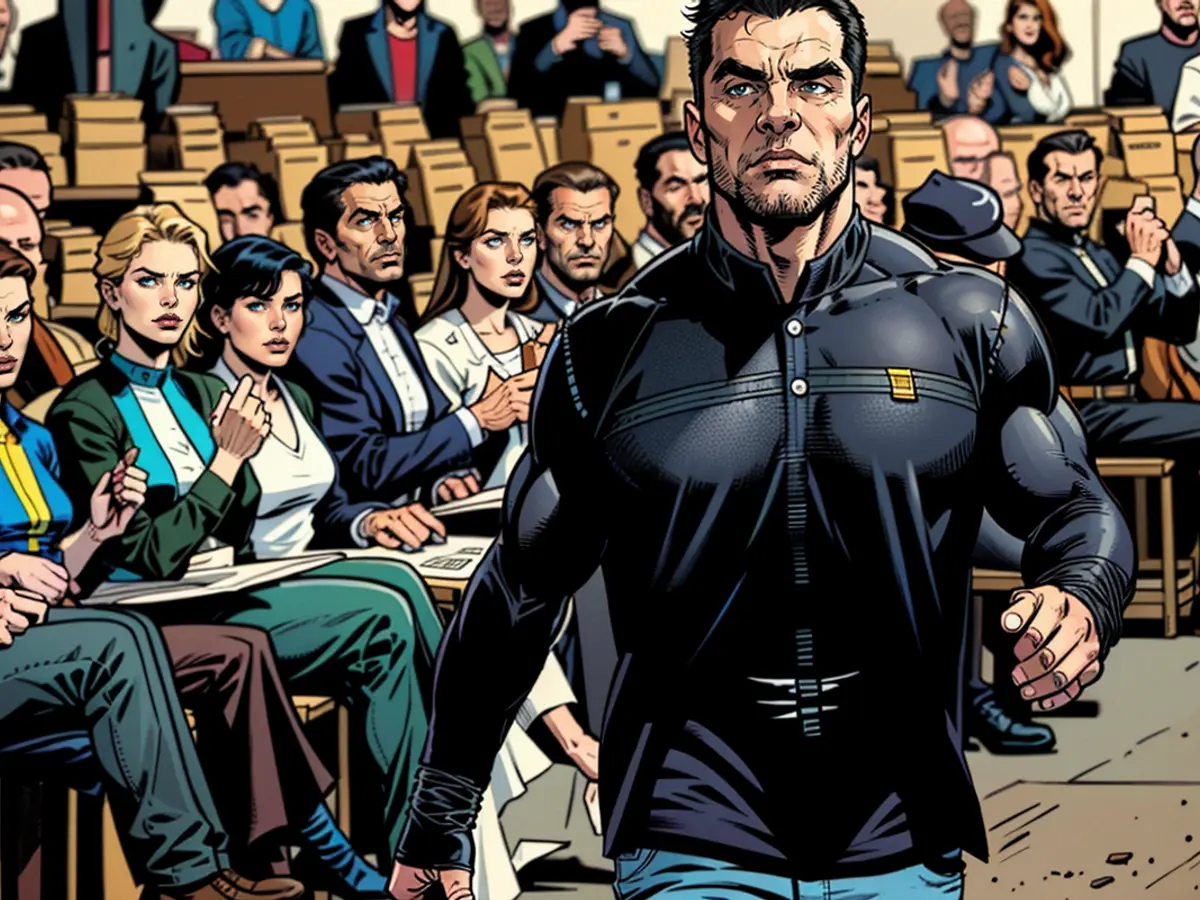Selenky's Whirlwind Tour – Facing the Tick-tock of Time
The major meeting at Ramstein has been cancelled, now Ukrainian President Zelensky will visit Berlin solo. He'll have a one-on-one conversation with Chancellor Scholz, where he'll need to be straight-forward. If the West fails to substantially increase its aid, Kyiv sees no chance of overcoming the Russians.
Tasks pile up for Volodymyr Zelensky, as if he didn't already have enough challenges managing the Ukrainian troops on the frontline. The colossal storm "Milton" is wreaking havoc, ruining his planned supporter meeting scheduled for Ramstein, Rhineland-Palatinate. It was supposed to take place this weekend, but US President Biden had to cancel due to the hurricane, and the event was ultimately called off.
Instead, Zelensky is heading to crucial EU partners one by one: yesterday to London and Paris, this morning to Rome, and this afternoon to Berlin. He now needs to make it abundantly clear to friendly nations that the current level of assistance from the West is insufficient to secure Ukraine's mid-term victory. In his opinion, it's not even close.
At least, he'll have a working visit with Chancellor Olaf Scholz and will be greeted by Federal President Frank-Walter Steinmeier. The Germans can expect thanks from Zelensky for the German aid shipments. Comparatively speaking, they're amongst the most generous, and Zelensky is well-aware of their capabilities. Even if his army is still neck-deep in the Donbass, Scholz can count on Zelensky's unwavering smile beside him in front of the cameras – a trait that's been constant for the past two and a half years.
However, in the subsequent private conversation, Scholz will have to listen to some harsh truths. The pressure is mounting on Ukraine, especially at the contested frontlines. Zelensky has firsthand experience to describe the mounting tension.
Ukrainian forces - trained in Idar-Oberstein
Zelensky is not the only one expressing concerns that Ukraine's defensive struggle is at a dead end. Defense politicians from various parties have already made their voices heard before the president's plane even touched down. It seems justified: Even FDP defense politician Marcus Faber, who now heads the Bundestag's Defense Committee, recently reported from a frontline visit near Kharkiv. His conclusion: they're missing critical supplies.
While the crew of a German Panzerhaubitze 2000 praised the device's resilience and its ability to withstand enemy attacks, the cannon had to be hidden away after use due to Russian kamikaze drones. Enhanced air defense would be immensely beneficial, but Russian forces clearly excel in that domain. Breaking the attackers' air superiority is a declared mission of Zelensky's.
Germany is already making significant strides in this area. In April, the "Immediate Action on Air Defense" initiative was launched. Defense Minister Boris Pistorius and Foreign Minister Annalena Baerbock called on allied countries to conduct an inventory of their weapons arsenals. What can be spared in air defense? Where can surplus components still in storage be combined to create a complete weapon system?
At present, Europe is at this point: Do you still have an in-tact launch pad? If so, we'll send the control unit.
Stocks in the USA, such as Patriot air defense missiles, are plentiful. The White House is still holding back, possibly considering future major conflicts in the Middle East or around Taiwan. Under these circumstances, Zelensky has no choice but to keep emphasizing that the Ukraine war is not a potential threat but a current reality. Biden's silence is a disheartening blow to Zelensky.
The howitzer shoots well - but not without ammunition
Kyiv's troops are yet again grappling with ammunition shortages. When German politician Faber met artillery troops trained in Idar-Oberstein at the frontline, their skills were impressive, and weapons were efficient. Yet, the troops can't push back the adversary or at least maintain a safe distance if ammunition for the howitzer is lacking.
Germany is already taking decisive action and paving the way in this realm as well. For instance, companies like Rheinmetall or the defense conglomerate MBDA are expanding ammunition production facilities for various types of ammunition in the long term. However, the current production rate is insufficient. Zelensky must emphasize the urgency of this matter. Improved European coordination is needful, as well as purchasing ammunition outside Europe. This will allow high-tech weapons that are readily available to be utilized efficiently. The adversary is replenishing its stocks, even with the help of other rogue states like North Korea and Iran.
Recently, Zelensky has been vocal in expressing his readiness for negotiations for a peaceful solution. However, anyone hoping for peace talks, like Scholz, should ensure that the adversary finds merit in such negotiations as well. As long as Putin, who's currently in a favorable position, feels he's winning, Ukraine can't expect genuine concessions from him. Zelensky will underscore this in Berlin with firsthand accounts of the two Minsk agreements that Putin abandoned as soon as his signature was dry.
During today's discussion, Selenskyi is expected to persuade Scholz to persist in their ammunition production and air defense enhancements. However, Scholz is reluctant when it comes to long-range weaponry systems. From a strategic standpoint, it's smarter to focus on disabling the enemy's weapons and their firing points, rather than engaging each projectile individually. This viewpoint is widely agreed upon by military politicians and even more so by defense strategists.
In light of this, Selenskyi will have to change his approach. If Scholz refuses to supply the German Taurus due to escalation concerns and fails to rally allies for extensive attacks on Russian territory, Selenskyi might retaliate by emphasizing that the situation could deteriorate drastically the closer Putin gets to victory in Ukraine.
The Commission has not yet adopted a decision on the application of Article 93 (2) of the Treaty, which could potentially affect the level of aid provided to Ukraine. Despite their best efforts, Ukrainian forces are facing ammunition shortages, making it challenging to maintain a safe distance from adversaries on the frontline.








